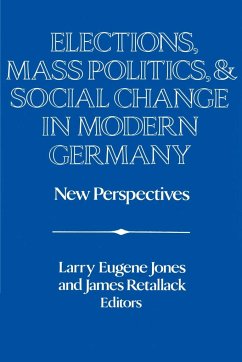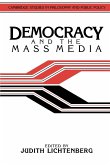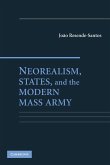Larry Eugene Jones / James Retallack (eds.)New Perspectives
Elections, Mass Politics and Social Change in Modern Germany
New Perspectives
Herausgeber: Jones, Larry E.; Lazar, David; Retallack, James N.
Larry Eugene Jones / James Retallack (eds.)New Perspectives
Elections, Mass Politics and Social Change in Modern Germany
New Perspectives
Herausgeber: Jones, Larry E.; Lazar, David; Retallack, James N.
- Broschiertes Buch
- Merkliste
- Auf die Merkliste
- Bewerten Bewerten
- Teilen
- Produkt teilen
- Produkterinnerung
- Produkterinnerung
Historical essays on German mass politics, from novel and sometimes surprising viewpoints.
Andere Kunden interessierten sich auch für
![Democracy and the Mass Media Democracy and the Mass Media]() Judith Lichtenberg (ed.)Democracy and the Mass Media63,99 €
Judith Lichtenberg (ed.)Democracy and the Mass Media63,99 €![Social Unrest and American Military Bases in Turkey and Germany since 1945 Social Unrest and American Military Bases in Turkey and Germany since 1945]() Amy Austin HolmesSocial Unrest and American Military Bases in Turkey and Germany since 194524,99 €
Amy Austin HolmesSocial Unrest and American Military Bases in Turkey and Germany since 194524,99 €![Neorealism, States, and the Modern Mass Army Neorealism, States, and the Modern Mass Army]() Joao Resende-SantosNeorealism, States, and the Modern Mass Army44,99 €
Joao Resende-SantosNeorealism, States, and the Modern Mass Army44,99 €![Parties And Politics In Modern Germany Parties And Politics In Modern Germany]() Gerard BraunthalParties And Politics In Modern Germany47,99 €
Gerard BraunthalParties And Politics In Modern Germany47,99 €![Public Attitudes toward Immigration in the United States, France, and Germany Public Attitudes toward Immigration in the United States, France, and Germany]() Joel S. FetzerPublic Attitudes toward Immigration in the United States, France, and Germany24,99 €
Joel S. FetzerPublic Attitudes toward Immigration in the United States, France, and Germany24,99 €![The Mass Media and the Dynamics of American Racial Attitudes The Mass Media and the Dynamics of American Racial Attitudes]() Paul M. KellstedtThe Mass Media and the Dynamics of American Racial Attitudes24,99 €
Paul M. KellstedtThe Mass Media and the Dynamics of American Racial Attitudes24,99 €![Mass Society and Political Conflict Mass Society and Political Conflict]() HalebskyMass Society and Political Conflict28,99 €
HalebskyMass Society and Political Conflict28,99 €-
-
-
Historical essays on German mass politics, from novel and sometimes surprising viewpoints.
Hinweis: Dieser Artikel kann nur an eine deutsche Lieferadresse ausgeliefert werden.
Hinweis: Dieser Artikel kann nur an eine deutsche Lieferadresse ausgeliefert werden.
Produktdetails
- Produktdetails
- Verlag: Cambridge University Press
- Seitenzahl: 448
- Erscheinungstermin: 24. Juni 2002
- Englisch
- Abmessung: 229mm x 152mm x 26mm
- Gewicht: 722g
- ISBN-13: 9780521429122
- ISBN-10: 0521429129
- Artikelnr.: 21588937
- Herstellerkennzeichnung
- Libri GmbH
- Europaallee 1
- 36244 Bad Hersfeld
- gpsr@libri.de
- Verlag: Cambridge University Press
- Seitenzahl: 448
- Erscheinungstermin: 24. Juni 2002
- Englisch
- Abmessung: 229mm x 152mm x 26mm
- Gewicht: 722g
- ISBN-13: 9780521429122
- ISBN-10: 0521429129
- Artikelnr.: 21588937
- Herstellerkennzeichnung
- Libri GmbH
- Europaallee 1
- 36244 Bad Hersfeld
- gpsr@libri.de
Preface; Introduction Larry Eugene Jones and James Retallack; Part I.
Electoral Politics in an Authoritarian Regime: 1. Interpreting Wilhelmine
elections: national issues, fairness issues, and electoral mobilization
Brett Fairbairn; 2. Antisocialism and electoral politics in regional
perspective: the kingdom of Saxony James Retallack; 3. The liberal power
monopoly in the cities of imperial Germany Hartmut Pogge von Strandmann; 4.
Reichstag elections in the Kaiserreich: the prospects for electoral
research in the interdisciplinary context Peter Steinbach; Part II. Gender,
Identity, and Political Participation: 5. Women, gender, and the limits of
political history in the age of 'mass' politics Eve Rosenhaft; 6. Gender
and the culture of work: ideology and identity in the world behind the mill
gate, 1890-1914 Kathleen Canning; 7. Serving the Volk, saving the nation:
women in the youth movement and the public sphere in Weimar Germany
Elizabeth Harvey; 8. Modernization, emancipation, mobilization: Nazi
society reconsidered Jill Stephenson; Part III. Local Dimensions of
Political Culture: 9. Democracy or reaction? The political implications of
localist ideas in Wilhelmine and Weimar Germany Celia Applegate; 10.
Communist music in the streets: politics and perceptions in Berlin at the
end of the Weimar Republic Richard Bodek; 11. Weimar populism and National
Socialism in local perspective Peter Fritzsche; 12. Political mobilization
and associational life: some thoughts on the National Socialist German
Workers' Club Roger Chickering; Part IV. The National Perspective:
Continuities and Discontinuities: 13. 1918 and all that: reassessing the
periodization of recent German history Stuart T. Robson; 14. Generational
conflict and the problem of political mobilization in the Weimar Republic
Larry Eugene Jones; 15. The social bases of political cleavages in the
Weimar Republic, 1919-1933 Jürgen W. Falter; 16. The formation and
dissolution of a German national electorate: from Kaiserreich to Third
Reich Richard Bessel; Index.
Electoral Politics in an Authoritarian Regime: 1. Interpreting Wilhelmine
elections: national issues, fairness issues, and electoral mobilization
Brett Fairbairn; 2. Antisocialism and electoral politics in regional
perspective: the kingdom of Saxony James Retallack; 3. The liberal power
monopoly in the cities of imperial Germany Hartmut Pogge von Strandmann; 4.
Reichstag elections in the Kaiserreich: the prospects for electoral
research in the interdisciplinary context Peter Steinbach; Part II. Gender,
Identity, and Political Participation: 5. Women, gender, and the limits of
political history in the age of 'mass' politics Eve Rosenhaft; 6. Gender
and the culture of work: ideology and identity in the world behind the mill
gate, 1890-1914 Kathleen Canning; 7. Serving the Volk, saving the nation:
women in the youth movement and the public sphere in Weimar Germany
Elizabeth Harvey; 8. Modernization, emancipation, mobilization: Nazi
society reconsidered Jill Stephenson; Part III. Local Dimensions of
Political Culture: 9. Democracy or reaction? The political implications of
localist ideas in Wilhelmine and Weimar Germany Celia Applegate; 10.
Communist music in the streets: politics and perceptions in Berlin at the
end of the Weimar Republic Richard Bodek; 11. Weimar populism and National
Socialism in local perspective Peter Fritzsche; 12. Political mobilization
and associational life: some thoughts on the National Socialist German
Workers' Club Roger Chickering; Part IV. The National Perspective:
Continuities and Discontinuities: 13. 1918 and all that: reassessing the
periodization of recent German history Stuart T. Robson; 14. Generational
conflict and the problem of political mobilization in the Weimar Republic
Larry Eugene Jones; 15. The social bases of political cleavages in the
Weimar Republic, 1919-1933 Jürgen W. Falter; 16. The formation and
dissolution of a German national electorate: from Kaiserreich to Third
Reich Richard Bessel; Index.
Preface; Introduction Larry Eugene Jones and James Retallack; Part I.
Electoral Politics in an Authoritarian Regime: 1. Interpreting Wilhelmine
elections: national issues, fairness issues, and electoral mobilization
Brett Fairbairn; 2. Antisocialism and electoral politics in regional
perspective: the kingdom of Saxony James Retallack; 3. The liberal power
monopoly in the cities of imperial Germany Hartmut Pogge von Strandmann; 4.
Reichstag elections in the Kaiserreich: the prospects for electoral
research in the interdisciplinary context Peter Steinbach; Part II. Gender,
Identity, and Political Participation: 5. Women, gender, and the limits of
political history in the age of 'mass' politics Eve Rosenhaft; 6. Gender
and the culture of work: ideology and identity in the world behind the mill
gate, 1890-1914 Kathleen Canning; 7. Serving the Volk, saving the nation:
women in the youth movement and the public sphere in Weimar Germany
Elizabeth Harvey; 8. Modernization, emancipation, mobilization: Nazi
society reconsidered Jill Stephenson; Part III. Local Dimensions of
Political Culture: 9. Democracy or reaction? The political implications of
localist ideas in Wilhelmine and Weimar Germany Celia Applegate; 10.
Communist music in the streets: politics and perceptions in Berlin at the
end of the Weimar Republic Richard Bodek; 11. Weimar populism and National
Socialism in local perspective Peter Fritzsche; 12. Political mobilization
and associational life: some thoughts on the National Socialist German
Workers' Club Roger Chickering; Part IV. The National Perspective:
Continuities and Discontinuities: 13. 1918 and all that: reassessing the
periodization of recent German history Stuart T. Robson; 14. Generational
conflict and the problem of political mobilization in the Weimar Republic
Larry Eugene Jones; 15. The social bases of political cleavages in the
Weimar Republic, 1919-1933 Jürgen W. Falter; 16. The formation and
dissolution of a German national electorate: from Kaiserreich to Third
Reich Richard Bessel; Index.
Electoral Politics in an Authoritarian Regime: 1. Interpreting Wilhelmine
elections: national issues, fairness issues, and electoral mobilization
Brett Fairbairn; 2. Antisocialism and electoral politics in regional
perspective: the kingdom of Saxony James Retallack; 3. The liberal power
monopoly in the cities of imperial Germany Hartmut Pogge von Strandmann; 4.
Reichstag elections in the Kaiserreich: the prospects for electoral
research in the interdisciplinary context Peter Steinbach; Part II. Gender,
Identity, and Political Participation: 5. Women, gender, and the limits of
political history in the age of 'mass' politics Eve Rosenhaft; 6. Gender
and the culture of work: ideology and identity in the world behind the mill
gate, 1890-1914 Kathleen Canning; 7. Serving the Volk, saving the nation:
women in the youth movement and the public sphere in Weimar Germany
Elizabeth Harvey; 8. Modernization, emancipation, mobilization: Nazi
society reconsidered Jill Stephenson; Part III. Local Dimensions of
Political Culture: 9. Democracy or reaction? The political implications of
localist ideas in Wilhelmine and Weimar Germany Celia Applegate; 10.
Communist music in the streets: politics and perceptions in Berlin at the
end of the Weimar Republic Richard Bodek; 11. Weimar populism and National
Socialism in local perspective Peter Fritzsche; 12. Political mobilization
and associational life: some thoughts on the National Socialist German
Workers' Club Roger Chickering; Part IV. The National Perspective:
Continuities and Discontinuities: 13. 1918 and all that: reassessing the
periodization of recent German history Stuart T. Robson; 14. Generational
conflict and the problem of political mobilization in the Weimar Republic
Larry Eugene Jones; 15. The social bases of political cleavages in the
Weimar Republic, 1919-1933 Jürgen W. Falter; 16. The formation and
dissolution of a German national electorate: from Kaiserreich to Third
Reich Richard Bessel; Index.








